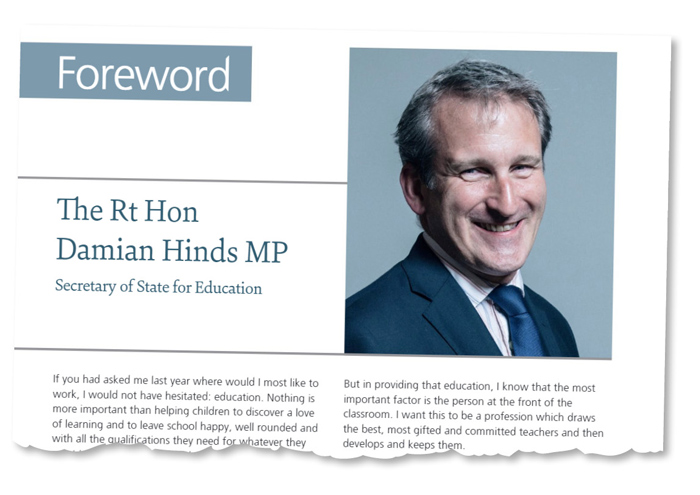A glossy magazine that charges heads thousands of pounds to publish content about their school was “misleading” over its links to government, the advertising watchdog has ruled.
The Advertising Standards Authority also ruled that the Parliamentary Review failed to make it clear that letters sent to potential customers are marketing communications, or that articles included in its publications are adverts.
Recipients were likely to understand that the Parliamentary Review was an official government publication, which was not the case
Two complainants said letters inviting businesses to be included in the magazine were not “obviously identifiable” as marketing communications, and misleadingly implied the Parliamentary Review was an official government publication.
They also complained it wasn’t obvious that content in the magazines themselves was marketing.
The ASA upheld all three complaints, and ordered Westminster Publications, the magazine’s publisher, to change the way it presents its publications and written communications, and make it clearer that it is not associated with government.
Schools Week revealed last November how headteachers felt misled after receiving letters from leading politicians telling them they had been selected to share best practice and attend a gala dinner in London, only to be asked to stump up thousands when they enquired further.

Leaders approached by the company said the involvement of dignitaries such as former education secretary Lord Blunkett and former communities secretary Lord Pickles, along with the inclusion of articles written by prime ministers and education secretaries, made it seem like an official publication, when in fact it is run for profit by a private company.
Under advertising rules, consumers should be able to tell from envelopes that they contain marketing materials.
In its ruling, the ASA agreed with the complainants that letters sent by the Parliamentary Review and signed off by politicians were not “obviously identifiable” as marketing communications.
It also agreed that the letters “misleadingly implied that the Parliamentary Review was an official government publication”. The ruling related to a complaint over letters issued to businesses.
The overall impression of the origin of the mailing was “ambiguous”, the ASA said, as it warned that recipients “were likely to understand that the Parliamentary Review was an official government publication, which was not the case”.

The ASA also agreed that articles in the magazine itself were also not identifiable as marketing communications, because the Parliamentary Review did not label them as advertising. This complaint related to articles contributed for The Parliamentary Review 2017-18, and viewed online in May this year.
In its official response to the ASA, Westminster Publications Limited said it was “not their intention to mislead consumers” in the letters, and pledged to add wording to future mailing stating that “the Parliamentary Review is wholly owned by Westminster Publications Ltd. It is independent of government and entirely funded by the organisations who appear in it”.
But the ASA said the proposed amendment “would not be sufficient to ensure the ad was obviously identifiable as a marketing communication in the absence of an explicit statement that the letter was an ad”.
In relation to the magazines themselves, Westminster Publications said it didn’t believe submitted articles counted as adverts because the content was controlled by them, and not the contributing organisation.

They said sponsored articles “did not include any agreement as to what the articles would say”, and that editorial guidelines were “sent to all contributors and clearly stated that The Parliamentary Review retained editorial control over the final published piece”.
However, guidelines provided to the ASA “related to stylistic considerations rather than content”, and the watchdog said that simply proofreading or editing the articles was not “in line with the definition of editorial control intended by the code”.
The ASA also noted that the Parliamentary Review’s website included an FAQ section that stated organisations are “free to use the Review, and their article within it, to promote themselves to a wide audience”, and that marketing letters stated that the review is “fiercely independent and, as such, you would have full freedom to express yourself entirely as you wish”.
“We considered that suggested that contributors retained control over the content of their articles,” the ruling stated.
The ASA has ruled that the adverts “must not appear again in the forms complained about”, and ordered Westminster Publications “to ensure that their marketing communications were obviously identifiable as such”.
“We also told them to ensure they did not imply that the Parliamentary Review was an official government publication.”
Westminster Publications Limited was approached for comment.








Inclusion in The Parliamentary Review is a glossy advert. Those who paid to be featured often boast they’ve been included a ‘government publication’ as an example of best practice.
But the Parliamentary Review isn’t a government publication. Puff pieces which are purchased aren’t independent endorsements. And when public bodies such as schools and hospitals pay to be featured, it raises the question about whether buying ‘endorsement’ is a proper use of public money.
If a result of spending money on any form of advertising – be it an ‘endorsement’ in the Parliamentary Review, a splurge in the local newspaper, or a banner on the school fence – is a value-for-money benefit to the school/trust (be it an increase in pupil applications, more applicants for teaching posts, or something else) then it is a good and proper use of public/charitable funds.
That being said, I’ve long been of the view that the whole Parliamentary Review business model is very shady. They probably do just enough to stay the right side of the line legally speaking but it doesn’t smell right. I’m surprised that David Blunkett is involved with them, I’ve always had a lot of time for him. If Schools Week hasn’t already approached him for comment I’d be interested to hear his take on things …
You’re right that the Review’s business model is shady. The title, the forewords by prominent politicians including the last PM and the current Chancellor of the Duchy of Lancaster, former education secretary, justice minister and Defra secretary, Michael Gove, all add to the perception that it’s a government publication when it isn’t.
Those organisations featured in the review were enticed by an email saying they’d been ‘chosen’ to appear. They were then persuaded to pay money to be promoted as examples of ‘best practice’ even when they weren’t. One school which featured in the 2016/17 edition, Boldon School, a community school in Tyne and Weir, has been judged to require improvement in its last three inspections.